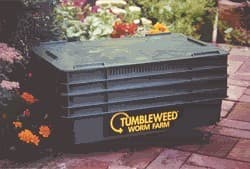Worm Composting or Vermicomposting

About Worm Composting
Vermicomposting, or worm composting, is an organic process. This organic composting process utilizes earthworms, that ingest plant matter, and excrete nutrient rich, natural, and very organic worm castings. Earthworms create worm casting equal to their weight every day. And experienced gardeners highly value worm castings.
Did you Know? It was only a few centuries ago, that people thought garden earthworms were a bad thing. Many people confused them with snakes. Others considered them a garden pest, and tried to rid their gardens of earthworms.
Definition of Terms
Composting – This is the process of decomposing plant matter into nutrient-rich soil to help organically feed your plants. Composting is accomplished in a variety of ways, from passive compost heaps (or piles) to compost tumblers, which can quickly turn your raw materials into finished compost. More on Composting.
Vermicomposting – This is the process of creating and harvesting castings. You feed worms plant materials. The worms excrete rich worm castings. The castings are separated from the worms themselves, and the rest of the compost.
Worm Composting – This is generally synonymous with vermicomposting. However, many people use this term to describe the process of converting raw plant materials into finished compost by using worms to help do the job. This compost contains both the decomposed material and castings.
Worm Farms – Vermicomposting is the composting process. Worm farms are where the process is performed.
Worms – Red worms and earthworms are the common residents of a worm farm.
Worm Castings – After eating and digesting plant matter, the worms excrete castings. You could call it “worm manure”. Organic castings are highly valued by gardeners.
Worm Casting Liquid Fertilizer – Your indoor and outdoor plants will love worm castings tea. Easy to use tea bags provides an organic, liquid fertilizer for all of your plants.
Armed with the definitions above, you are now ready to become a worm farmer who practices vermicomposting (worm composting), to harvest worm castings.
Types of Worms
There are virtually thousands of varieties of worms, found all over the world. There are two types of worms that are best known to gardeners and are good in worm farms. They are:
Red Worms – These little guys are the most often used for worm composting. Most people who have worm farms prefer to use efficient, hard-working red worms.
Nightcrawlers – Those big, fat worms that fisherman seek, are good composters, too. They are also effective aerators, helping to loosen the soil so plant roots can spread easier. Their big, deep tunnels and burrows allow water and moisture to penetrate deeper into the soil where your plant’s roots are. Nightcrawlers also leave plenty of worm castings deep in the soil.
Deters Insects and Pests
Epsom Salt is a natural deterrence for some garden pests, too.
Slugs stay away from it. Sprinkle a little in a circle around your plants. Slugs and snails will not cross it.
Voles, mice, squirrels, and rodents do not like it, and will stay away.
Plants That Benefit from Epsom Salt
You can use this fertilizer on all of your plants.
Gardeners find it is most useful on Roses, Tomatoes, and Peppers.
Try a little on your indoor houseplants.
How to Apply as a Plant Fertilizer
For roses, spread 4 ounces around each rose bush in the spring. Mix it into the surrounding soil. For summer applications Mix 1 Tablespoon in a gallon of water.
For Tomatoes and peppers, mix 1 Tablespoon in a gallon of water. Apply in the summer months. It will help to improve production.
Be careful with foliar feeding. Epsom Salt can scorch leaves. Avoid foliar feeding of roses.
For other plants use 1 Tablespoon in a gallon of water.
Do not apply foliar feeding on hot, sunny days.
Related Articles
People who like this article will also like:
Please support our site. Shop for:
- rmmatthews100@hotmail.com
- 585-721-6528
- Rochester, NY
©1999-2024 GardenersNet.Com, All Rights Reserved

